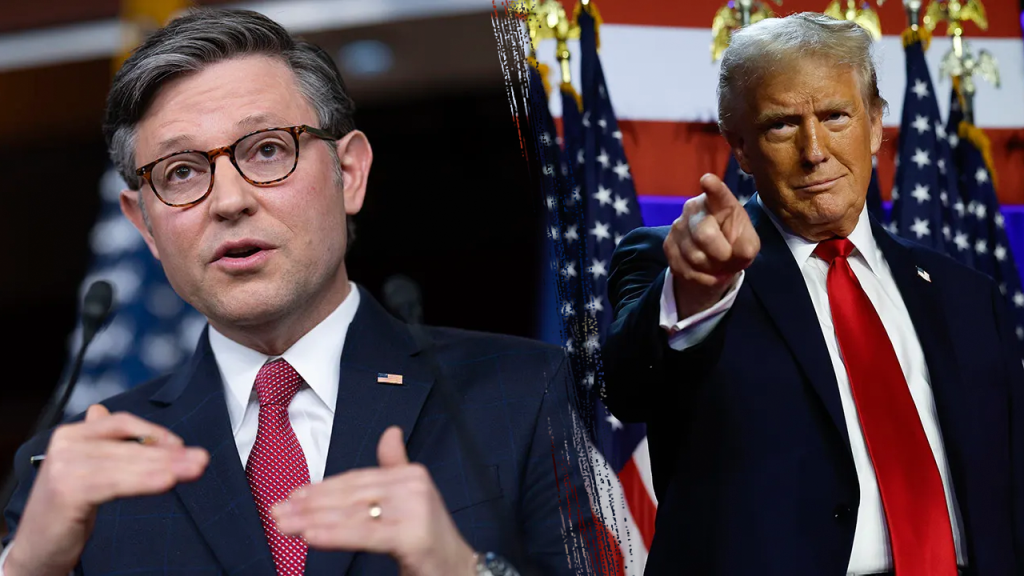Paragraph 1: Setting the Stage for a Unified Republican Agenda
President-elect Donald Trump’s endorsement of a single, comprehensive reconciliation bill has effectively quelled internal Republican discord over the legislative strategy for advancing their policy priorities. The decision, relayed to House Republicans by Speaker Mike Johnson, aims to consolidate various conservative objectives into a single legislative package, streamlining the process and presenting a unified front. This approach contrasts with earlier proposals suggesting a two-bill approach, which had generated friction within the party, particularly concerning the prioritization and potential jeopardy of tax cuts. With Trump’s backing, the focus now shifts towards crafting a cohesive bill encompassing key areas like border security, energy, permitting reform, and the extension of the 2017 Tax Cuts and Jobs Act.
Paragraph 2: Navigating the Reconciliation Process
The chosen legislative vehicle, reconciliation, offers Republicans a strategic advantage in the Senate, allowing them to bypass the usual 60-vote threshold required for most legislation. This maneuver requires a simple majority, facilitating the passage of significant policy changes without bipartisan support. However, the reconciliation process is subject to strict procedural constraints, overseen by the Senate parliamentarian, who determines the relevance of provisions to budgetary and fiscal matters. This oversight introduces a layer of complexity, as provisions deemed extraneous to fiscal considerations can be struck down. Historical precedents, such as the Democrats’ unsuccessful attempt to include mass amnesty measures in a reconciliation bill, underscore the parliamentarian’s influence and the potential challenges Republicans may face in incorporating border security provisions.
Paragraph 3: Consolidating Republican Priorities
The decision to pursue a single reconciliation bill marks a departure from earlier discussions within the Republican caucus. Senate Majority Leader John Thune and prominent Trump advisor Stephen Miller had advocated for a two-bill approach, separating border security and defense from tax policy. This proposal aimed to address concerns about the feasibility of passing a large omnibus bill and potentially prioritize border security. However, this approach drew criticism from House Republicans, particularly those on the Ways and Means Committee, who argued that splitting the bill risked jeopardizing the extension of Trump’s tax cuts, set to expire at the end of the year. They cautioned that prioritizing border security in a separate bill could leave tax provisions vulnerable to political maneuvering and potential expiration.
Paragraph 4: The Case for a Unified Bill
House Ways and Means Committee Chairman Jason Smith championed the single-bill approach, emphasizing the importance of packaging border security, energy, permitting reform, and tax provisions together. This strategy, he argued, maximizes the chances of achieving all of these legislative goals. He warned that the expiration of Trump’s tax cuts could lead to a significant tax increase for average Americans, a scenario Republicans sought to avoid. Smith also highlighted the historical precedent, noting that Congress hadn’t successfully passed two reconciliation bills in a single year since 1997, suggesting the logistical and political challenges of such an undertaking.
Paragraph 5: Balancing Competing Priorities
While acknowledging the complexity of tax legislation, House Freedom Caucus Chairman Andy Harris underscored the need to prioritize border security. He suggested pursuing both border security and tax cuts on parallel tracks, recognizing the importance of each issue to the Republican base. This highlighted the tension within the party between different priorities, even as they coalesced around the single-bill strategy. The debate emphasized the challenge of crafting a bill that would satisfy all factions within the party while also adhering to the strictures of the reconciliation process.
Paragraph 6: The Path Forward
With Trump’s endorsement of a single reconciliation bill, Republicans now face the complex task of crafting legislation that addresses their diverse priorities within the confines of the reconciliation process. The potential inclusion of border security measures remains a point of contention, subject to the Senate parliamentarian’s interpretation of its budgetary relevance. The looming expiration of Trump’s tax cuts adds urgency to the process, as Republicans strive to prevent tax increases for Americans. The single-bill approach, while presenting a unified front, necessitates delicate negotiations and compromises within the Republican caucus to ensure the passage of a bill that can deliver on their core campaign promises. The looming deadline of May, set by Trump himself, adds further pressure to the legislative process, demanding efficient negotiation and swift action.















